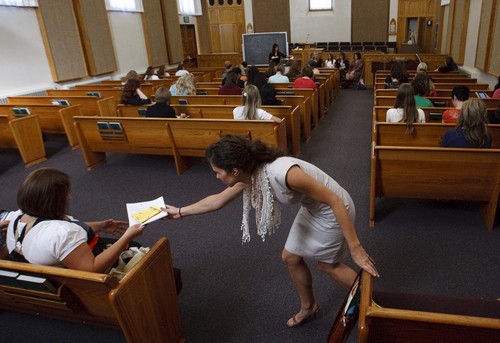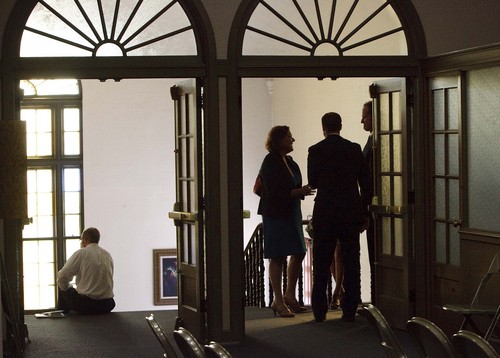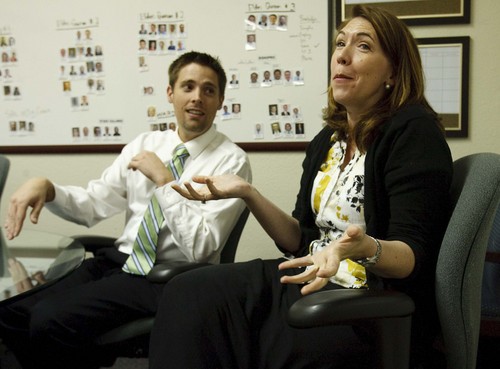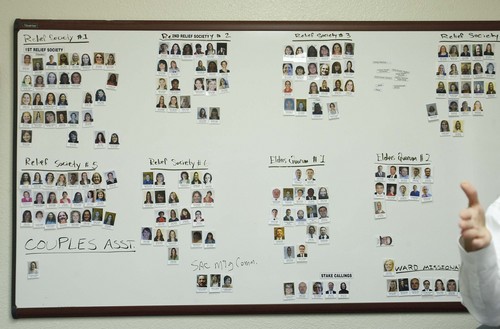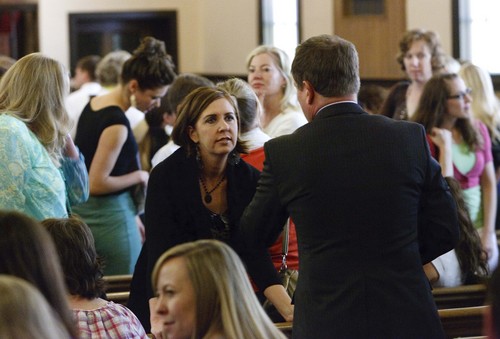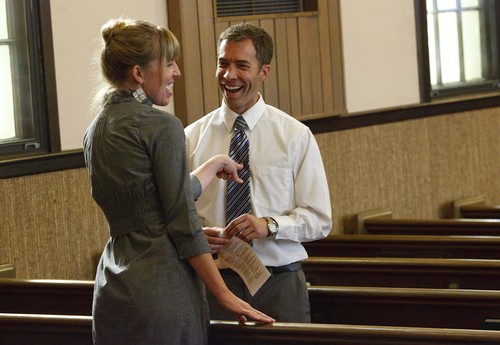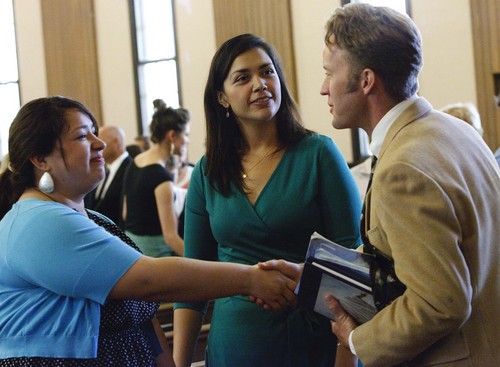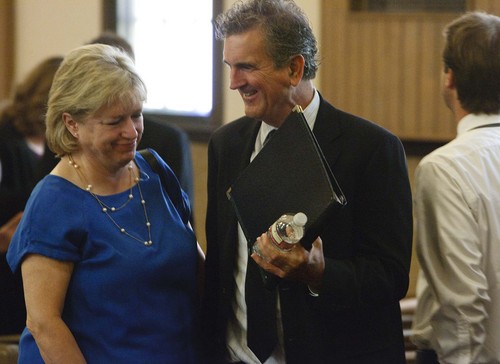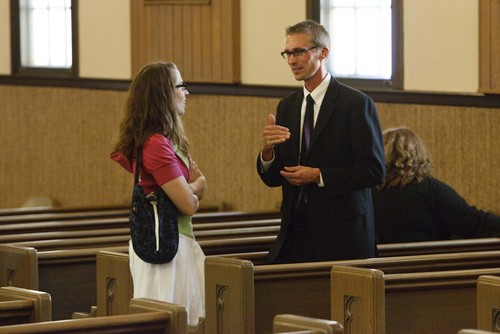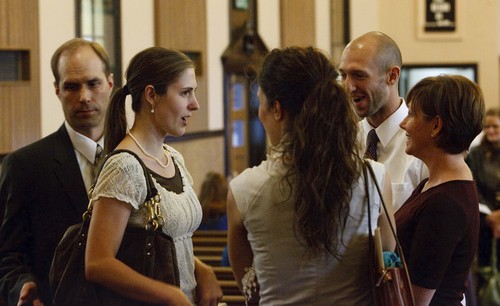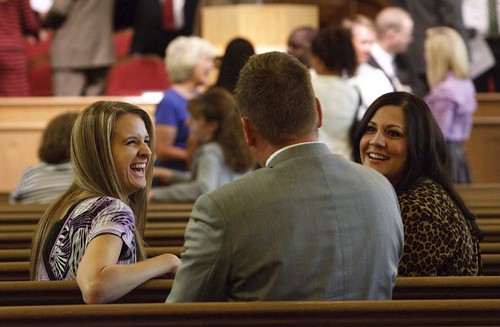This is an archived article that was published on sltrib.com in 2013, and information in the article may be outdated. It is provided only for personal research purposes and may not be reprinted.
Mormon congregations don't typically require members to have transportation, commit to active participation, accept assignments, be employed and forgo any church welfare.
But LDS wards for "mid-singles" are anything but typical.
These congregations — where such rules can be in play — are made up exclusively of nonmarried Mormons ages 31 to 45. They offer no programs for children or teens. Their main purpose is to provide a haven for LDS singles in a marriage-dominated faith and to help them meet potential mates.
Such wards seem to be flourishing in Utah and other urban centers — Boston, Los Angeles, San Francisco, Washington, D.C. — and the governing LDS First Presidency has approved the creation of new ones.
In the Beehive State, mid-singles wards have grown large and unwieldy — some as big as 650 regular attendees. Their geographical boundaries are vast — one ward extends from 2100 South in Salt Lake City to 6200 South — and their all-volunteer clergy is stretched to the limit.
Salt Lake City's Parley's Seventh Ward has an average weekly attendance of 650 — out of 693 on the roll, 264 males and 429 females — divided into six female Relief Societies and three male Elders Quorums (most Mormon wards have one of each). The ward also has smaller groups that assemble for Monday night activities. In the past year, it has had 60 weddings.
The east-side congregation, which meets in the historic Granite Tabernacle, at 2005 S. 900 East, is not a place for casual commitment, and the rules are in place "for sheer manageability," says Bishop Chris Nielson, who owns a construction company.
"We are hoping to give everyone the best experience," Nielson explains. "We are so geographically dispersed. If members have financial problems, for example, we will take care of them. But it would be taxing for this ward, so they would be better off having a bishop [who lived nearby]."
Other mid-singles bishops say the rules help keep deadbeat dads, sexual predators and the less committed from preying on their members.
The Parley's congregation is so well-organized, with so many ward leaders assigned to help the bishop look out for everyone, Nielson says, that it provides a feeling of safety and security — especially for the women.
The membership requirements at some of these wards — described at times as "wards of privilege" — are not about wealth but participation. Still, those expectations may have kept away potential joiners.
"I understand what they are trying to accomplish with the rules, but without any context, they seem heartless," says Jared Brenner, a Salt Lake City Mormon in that age who now goes to his local family ward. "These rules are not from the church handbook. It's local leaders adapting as they think they need to, but it's strange not to feel welcome at church."
Whether they worship with other singles or with families, the number of Mormons in this demographic is rising. Like many Americans, more and more of them are divorced and more and more of them are tying the knot later.
And many are slipping away from the Utah-based Church of Jesus Christ of Latter-day Saints.
Why?
Well, some older singles feel invisible or worse, pariahs, in a faith that preaches eternal marriage, a faith where fatherhood and motherhood are extolled as humanity's main roles, and where couples anticipate marching two by two into heaven. Sure, LDS leaders promise these singles will get a partner in the hereafter — which one single woman called a "celestial tax break or reimbursement" — but that can ring hollow for the here and now. Afterlife assurances can come off as comforting at best and condescending at worst.
The idea behind these singles wards is to bring together Latter-day Saints of similar circumstances to a place where they can feed their souls spiritually and, at the same time, socially. They can meet, mingle and, hopefully, match up.
A lively experiment • People are squeezed into every square inch of the Granite Tabernacle for Sunday worship. The main chapel is filled to the edges, and congregants are watching TV monitors in the overflow area, and looking down from the balcony.
As Nielson, the Parley's Seventh Ward bishop, walks down the aisle after sacrament meeting, he cannot take a step without someone thrusting a gray tithing envelope into his hands, tapping him on the shoulder or asking him a question. One young couple shyly hand him a wedding announcement for the coming Wednesday.
"I personally love the size of the ward," Nielson says. "That gives our members more opportunities to meet others. There is so much power and energy in this ward. The amount of good this ward does is off the charts. I have never seen a group of people so willing to do for others."
A Mormon congregation might provide one or two "subs for Santa" to needy children, he says. His singles took care of 125, raising more than $40,000 in one night.
A group of the singles works with Salt Lake City's Calvary Baptist Church to provide breakfast every Sunday at Pioneer Park, says Nielson's wife, Heidi.
"You can find anything you want to find here," says Jordan Callister, Elders Quorum president No. 1. "There are so many people here for the right reasons. It's like a mecca of single people coming together."
Kristen Rushton, one of the Relief Society presidents, says the size can be overwhelming "but we are organized for interaction with smaller groups."
Callister and Rushton say the rules help manage the ward, but the bishop has wide discretion to make exceptions.
There is no stigma for divorced members, says Rushton, who works at Myriad Genetics. "We make an effort to reach out to everyone. "
The goal, they say, is not just pairing off, but worshipping together.
"We have a lot of very talented people," Rushton says. "It's a spiritual experience every Sunday."
Not a group, they say, to be pitied.
Misperceptions • Lauren Henderson, who recently married, applauds the LDS Church's effort to help its singles.
"I don't know another singles group," she writes in an email from the Dominican Republic, "with as many opportunities to meet and mingle as LDS singles."
Still, says Henderson, who spent a number of years in a mid-singles ward, the message too often is about what they lack, rather than what they bring to the Mormon community.
In one church service Henderson attended as a single, an LDS high councilman's wife felt sad for the singles because, unlike her family ward, the unwed didn't have any mission presidents or general authorities among their congregation since top Mormon leaders are always married or widowed.
"I looked around at the congregation full of friends and saw the woman who started and ran a nonprofit organization in Salt Lake City, the successful journalist, the CEO of a successful company, and multiple graduate degrees," Henderson says, "I thought to myself, 'Many people don't have a ward full of exceptional, talented people like the people I'm surrounded by right now.' "
She loved the camaraderie and courage of other singles.
"We came without the push of a spouse or parents. We picked one another up and carpooled. We encouraged our friends to be there," she says. "I was, myself, sitting between two friends who were trying to come back to church and feel accepted. Singles love the gospel, but don't feel they belong. Their testimonies are strong and fragile at the same time. I wonder how many chose not to come back again after those remarks that day."
Mormonism is about "uplifting each other," Henderson says, not beating anyone down. "We don't really need advice on dating — I think we have that covered — as we much as we need the uplifting gospel message, love and support."
Adrift among the couples • Married Mormons "do not understand what it means to be single," wrote Marie Cornwall, a retired Brigham Young University sociologist in a 1987 Sunstone essay that still represents her view. "Their understanding of single life is based on their own experiences when they were young and less mature. Having married, they attribute their sense of adulthood to marriage and family."
Cornwall, who has never married, says single people measure their adulthood by career promotions, financial stability and associations with other adults.
Too often, she says, LDS leaders treat singles as if they are stunted in their emotional development and often "infantilize" the unmarried, presuming marriage alone implies maturity.
"The church is about establishing an ideal and pointing people toward it. Sometimes that means not knowing what to do with people who don't achieve the ideal," Cornwall says in an interview. "They seem much more able to welcome someone who has been a drug addict and come back than to welcome a single person in their late 30s who has never left."
According a Facebook group discussing Mormon singles, several false presumptions about them abound:
• They are "damaged" in some way. You can tell because they are single.
• They go inactive because they are having secret sex.
• Those who don't go inactive are a threat to other people's marriages.
• They should dedicate their lives to LDS Church service because they have a lot of free time and nothing better to do.
For some, there seem to be unwritten rules for Mormon singles who worship with couples and families.
"Sundays are my 'other' life," says Tanesha Garland, a single LDS professional in Austin, Texas, who feels well respected in her workplace but not necessarily in her Mormon ward. "People will save pews and not allow me to sit because they need more room for the kids. In a crowded hallway, men drop glances to the floor to avoid having to say 'good morning' to me. ... Talk about an isolating 'issue of blood' in a crowd. I get that in spades. I totally understand that woman's relief at being healed and welcomed into a community."
If you are lucky, says Cornwall, the BYU sociologist, the focus on marriage may decline as people move out of their 40s and 50s.
"Many people have drifted back from singles wards so you are unlikely to be the only one," says Cornwall, who lives in Salt Lake City. "You begin to be joined by people who are divorced or maybe even widows and widowers. You don't have the same experience of being set apart from everyone else."
Married members stop asking why you are not married, Cornwall says, and no longer rush to line you up with potential mates.
To the singles cramming into the Parley's "ward of privilege," such peace of mind may seem a long way off.
Mormon mid-singles congregations
Bloomington Hills Seventh Ward, Utah
Charles River Ward, Massachusetts
East Bay Ward, California
Emigration Second Ward, Utah
Glendale Ninth Branch, California
Lake Ward, California
Logan 18th Ward, Utah
Monument Park 19th Ward, Utah
Oak Hills Eighth Ward, Utah
Pacific Beach Ward, California
Parley's Seventh Ward, Utah
Potomac Ward, Virginia
Sunset 12th Ward, Utah
Union Fort Ninth Branch, Utah
Washington Parkway Ward, Utah


